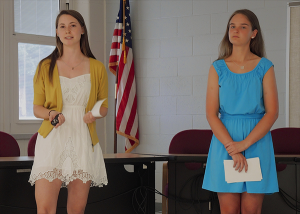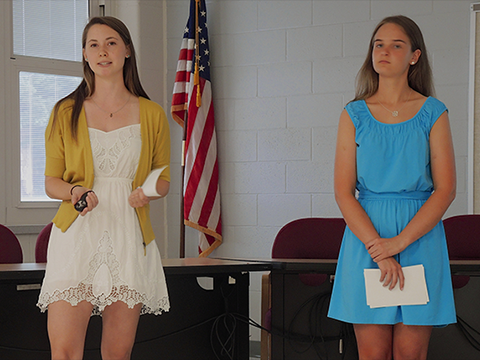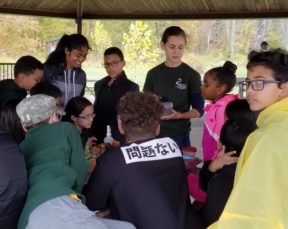Bernards H.S. AP Environmental Science students draw on their academic studies to help protect local water resources.


Bernards H.S. AP Environmental Science students Sarah Finn (left) and Kristen Mlynarski discuss the benefits of rain barrels, rain gardens, and other water-conserving landscape projects. Along with fellow students Sarah DeMarco and Grace Lobo (not pictured), they focused their presentation on helping homeowners manage stormwater runoff outside the home. Credit: Ed English.
For the second year in a row students from Bernards High School have worked together to turn lessons learned in the classroom into actions with important real-world impact.
Members of Karen DeTrolio’s Advanced Placement (AP) Environmental Science class used the last five weeks of their school year after their AP exam to research, produce, and deliver a series of presentations that help Bernardsville-area residents learn more about local water resources and take steps to protect them from damage.
On Wednesday, June 4, and Thursday, June 5, twelve student project groups took center stage in the high school’s Community Room to deliver their findings and solutions. The audience for this symposium included their peers; several teachers; community representatives from the Bernardsville Environmental Commission, the Bernardsville Green Team, the New Jersey Water Supply Authority, Eco-Schools USA, and the Great Swamp Watershed Association; and several VIPs, including Bernardsville Borough Councilmembers Janet Waite and Jeffrey DeLeo, Somerset Hills School District Superintendent Dr. Frances Wood and Assistant Superintendent of Curriculum & Instruction Jennifer Shouffler, Bernards High School Principal Scott Neigel, and Assistant Principal Michael Corbett.
“Sitting in on Mrs. Detrolio’s AP Environmental Science student presentations is always a highlight for me at the end of the school year,” said Principal Neigel. “These projects are a testament to the students’ hard work and Mrs. Detrolio’s dedication to her students as well as her passion for Environmental Science.”
Expectations for each project group were set high from the outset. As soon as students received their assignments they knew that the brochures, slides, research reports, and other materials they produced would become part of a current environmental education and outreach campaign known as “Watershed Friendly Living” that is produced and made available to local communities by the Great Swamp Watershed Association.
Hazel England, director of education and outreach at the Great Swamp Watershed Association, partnered with DeTrolio to design and implement the post-exam project, and served as an expert advisor to all of the groups.
“I have worked with these AP students on other projects throughout the year,” England said, “but these presentations were the real carrot for focusing their energy.”
“I think their positive, dedicated response to this assignment has everything to do with the fact that their work will actually be used to help local communities and improve the health of water in our watershed,” she added.
Students researched a variety of common environmental issues affecting the health and purity of water in the Great Swamp Watershed region and beyond. The final symposium included presentations on selecting water-efficient lawn and garden irrigation techniques, the benefits of installing water-conserving rain barrels, the importance of cleaning up after pets, selecting environmentally friendly pool maintenance techniques, creating water and wildlife friendly lawns and rain gardens, the benefits of choosing tap water over bottled water, selecting environmentally friendly household cleaning products, reducing household water use, and combatting stormwater pollution and erosion by strategically replacing native trees lost during Hurricane Sandy.
“The most rewarding aspect of the project for me is watching students delve deeper into topics they learned about throughout the year,” said teacher Karen DeTrolio. “They came up with realistic strategies to address the issues, and I believe that is empowering.”
“It is inspiring for me to see the students so engaged,” she added, “especially with prom and graduation in the near future, and ‘senioritis’ in full affect.”
A panel of judges drawn from the staff of the Great Swamp Watershed Association and other community groups evaluated each presentation. Not only were those evaluations factored into each student’s final project grade, but they were also used to identify the best presentations delivered during each day of the symposium. Winners from both of the top groups received a small prize.
Dan Anthony, Alexandra Fehnel, Peri Levine, and Caleigh Cassidy took home top honors on the first day for “Going, Going, Gone,” a project exploring ways in which homeowners can select native trees for their yards in a way that balances environmental benefits, natural beauty, and potential damage from storms.
Laura Dominguez, Pat Loughlin, Brooke Savoye, and Jordan Shack won on the second day for “Why Becoming Disconnected Is A Good Thing,” a project exploring how homeowners can reduce their water bills and help reduce the negative effects of stormwater pollution by installing a household rain barrel.
“[Working on this project] was great,” said senior Alexandra Fehnel. “We researched an issue that affected our local community and looked into ways to resolve it, and we found several small and large ways to make a positive difference in our watershed.”




